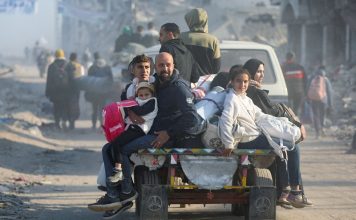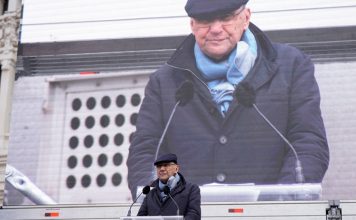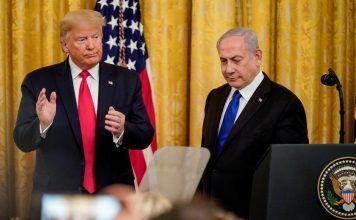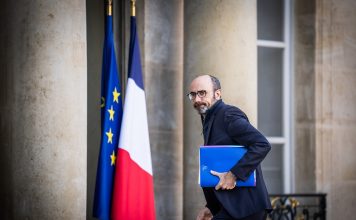Death sentences in Iran for three men who took part in a wave of anti-government protests in November have been denounced by 13 experts at the Office of the United Nations High Commissioner for Human Rights.
The experts — led by Mr. Javaid Rehman, the UN’s Special Rapporteur on the situation of human rights in the Islamic Republic of Iran — have demanded in a statement issued last week that Iran’s government overturn the sentences for protesters Amir Hossein Moradi, Saeed Tamjidi, and Mohammad Rajabi.
[aesop_image img=”https://kayhanlife.com/wp-content/uploads/2020/07/moradi_tamjidi_rajabi.jpg” panorama=”off” credit=”Mohammad Rajabi,Amir Hossein Moradi and Saeed Tamjidi. Kayhan London./ ” align=”center” lightbox=”off” captionsrc=”custom” captionposition=”center” revealfx=”off” overlay_revealfx=”off”]
“We join hundreds of thousands of Iranians on social media who condemned these death sentences,” the statement reads. “We urge the head of the judiciary to immediately quash this decision and to grant a prompt and independent judicial review.”
The call comes after an online campaign demanding an end to executions in Iran — started on July 14 by people inside the country and around the world — went viral on social media.
Kaveh Moussavi, a human rights lawyer and former Head of Public Interest Law at Oxford University, said the pressure placed on Iran by the UN was likely to have an effect on the Iranian government’s decision to sentence the three men to death.
“At a time when Iran is desperate, I think the United Nations’ call to end executions will have an impact. President Rouhani and his followers are desperate to stop these kinds of executions from happening,” he said. “But the Islamic Revolutionary Guards Corps is equally determined to terrorize the population into submission.”
The campaign had been launched initially to raise awareness about the death sentences for the three protesters, and began with the Persian language hashtag #اعدام_نکنید (#
U.S. President Donald Trump voiced his support for the movement with a tweet in Persian on July 15, including the original Persian hashtag, saying that the executions sent a “deplorable message to the world and should not be carried out.” The German government also called for an end to the death penalty in Iran on the same day, through its Foreign Office Twitter account.
سه نفر در ایران برای شرکت کردن در تظاهرات محکوم به مرگ شده اند. اعدام آنها در هر لحظه قابل انتظار است. اعدام این سه نفر پیامی اسفناک به دنیا می فرستد و نباید انجام شود. #اعدام_نکنید
— Donald J. Trump (@realDonaldTrump) July 15, 2020
The German Government strongly advocates bilaterally & on a multilateral level for the abolition of the death penalty and the improvement of the human rights situation in Iran. We have clearly addressed these cases with Iran today, also in the framework of the EU presidency. https://t.co/CKQBLnU9WV — GermanForeignOffice (@GermanyDiplo) July 15, 2020
Appearing to bow to domestic pressure over the sentences, Babak Paknia, one of the protester’s lawyer, said on July 19 that the government’s supreme court had announced it would suspend the executions and review the verdicts. Paknia said the men’s mobile phones, taken by officials, held vital evidence showing the protesters were not in the vicinity at the time of the alleged offenses.
درخواست اعاده دادرسی از سوی دیوان عالی کشور پذیرفته شد#امیرحسین_مرادی #سعید_تمجیدی #محمد_رجبی
— Dr.Babak Paknia (@DrPaknia) July 19, 2020
[Translation of the Tweet: Request for retrial has been accepted by the Supreme Court #AmirHossein_Moradi #Saeed_Tamjidi #Mohammad_Rajabi)]
Referring to the November protests in the statement, the UN experts said, “This case is not an isolated incident. There are widespread reports of arbitrary detention of protesters and torture to obtain false confessions. Other individuals have also reportedly been imprisoned and possibly sentenced to death for their participation in the protests.”
Ongoing demonstrations in Iran over the government’s mismanagement of the economy and widespread corruption came to a head last November, when more than 3,000 people took to the streets of Iran’s capital Tehran in protest.
Iran’s security forces have been accused by international human rights organizations of using lethal force to disperse the demonstrators. More than 300 Iranians are believed to have been killed by Iran’s security forces during the demonstrations, which spread to several other cities and towns across Iran. According to Reuters, there were as many as 1,500 deaths.
The statement by the UN experts also raises concerns about allegations that the men were badly beaten and tortured into making confessions, and were denied fundamental legal rights during their trial, including access to lawyers.
The UN followed up its demand that the Iranian government quash the death sentences for the three protesters with another statement issued on July 22, asking for the release of human rights activist Narges Mohammadi and other individuals who UN experts said had been arbitrarily detained. Mohammadi had reportedly been infected with Coronavirus, and needed urgent medical treatment after losing consciousness on July 5. She has been routinely denied medical assistance by prison officials.
In the statement, the UN said, “We yet again call on Iran to immediately release Ms. Mohammadi, as well as all others who are currently denied their right to liberty in contravention of Iran’s obligations under the International Covenant on Civil and Political Rights.”
Moussavi said the Iranian regime’s emphasis on executions in the criminal justice system was not effective in deterring public dissent and needed to be stopped.
“In Iran, it is politics that determines the outcome of a case, rather than the law,” he said. “I just hope the regime recognizes that this has got to be the end of the road. There is a limit to how much executions can secure compliance and they are now very counterproductive.”
Despite the use of the death penalty in Iran for a wide range of offenses, Iranians have continued to protest across the country. Last Thursday, anti-government protests were reported in the city of Behbahan, with dozens of videos posted on social media showing protestors chanting, “Fear not, fear not, we are in this together!” Other demonstrators could be heard chanting slogans criticizing senior government officials.
A strong police presence could also be seen in the video footage. Reports of several arrests being made during the protest were published by Iranian media outlets. Online monitoring body NetBlocks said online access had been disrupted in the area for several hours during the protests.







